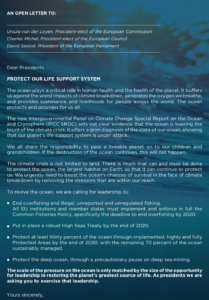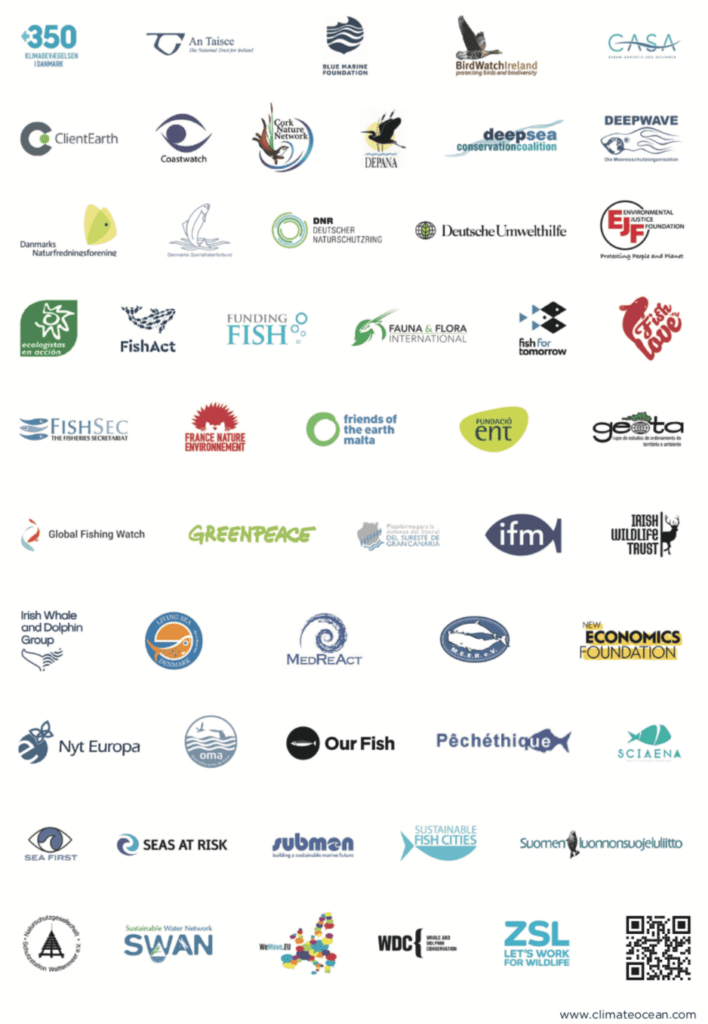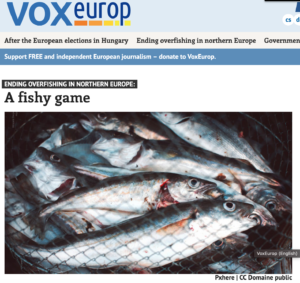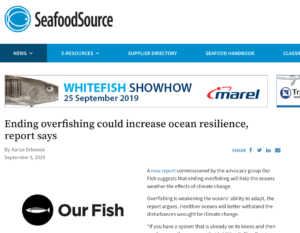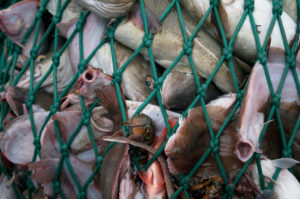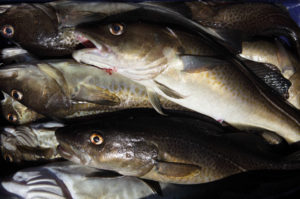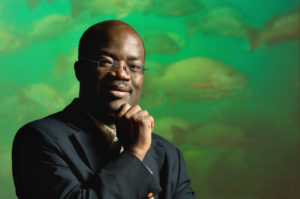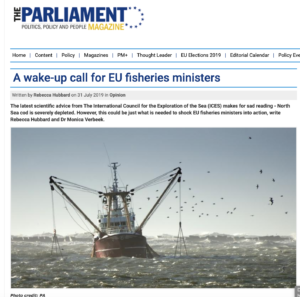25 september 2019, København – Som reaktion på dagens offentliggørelse af en længe ventet særrapport om klimaforandringer, hav og is (SROCC) fra FN’s Klimapanel har 52 europæiske NGO’er netop sendt et åbent brev til EU’s stats – og regeringsledere. Underskriverne er bl.a. Danmarks Naturfredningsforening, Danmarks Sportsfiskerforbund, Greenpeace og Our Fish. Organisationerne peger på den klare og videnskabeligt underbyggede sammenhæng mellem et sundt havmiljø og et sundt klima og opfordrer på det kraftigste EU’s ledere til at få sat fart på havbeskyttelse som led i kampen mod klimakrisen. [1,2].
“Gretha satte i mandags stærke ord på den frustration og de krav til handling, som hun og tusindvis af andre unge har til verdens lederes ved FN’s klimaforsamling. Vi vil gerne supplere de unges opråb ved at minde lederne om, at havbeskyttelse er et afgørende værktøj i forhold til at løse klimakrisen, og at værktøjet både er tilgængeligt og realistisk at gøre brug af allerede nu, siger Berit Asmussen, kampagneansvarlig i Our Fish i Danmark.
“Havet giver os hvert andet åndedrag og beskytter os ved at opsuge en stor del af den menneskeskabte CO2, men det fungerer ikke optimalt, hvis vi ikke passer på det. Selvom havet kan virke som en endeløs kilde til mad og glæde, så har det naturligvis også sine begrænsninger, og vi er godt i gang med at forskubbe balancen og sætte det gode forhold mellem menneske og hav over styr”, fortsætter hun.
I brevet står der bl.a:
“Havet spiller en afgørende rolle for menneskets og planetens velbefindende. Det fungerer som en buffer mod de værste konsekvenser af klimakrisen, genererer ilt og tilvejebringer livsvigtige ressourcer til glæde for mennesker over hele verden. Havet beskytter os alle…
Klimakrisen er ikke begrænset til landjorden. Meget kan og skal gøres for at beskytte havet, som er det største habitat på jorden, så havet fortsat er istand til at beskytte os. Vi må straks styrke havets mulighed for at overleve klimakrisen ved at fjerne de stressfaktorer, som vi rent faktisk kan fjerne”
Brevet beder EU’s ledere om at:
- Stoppe overfiskeri og ulovligt fiskeri. Alle EU Institutioner og medlemslande skal implementere og håndhæve den Fælles Fiskeripolitiks deadline for stop af overfiskeri i 2020.
- Sikre en robust FN-havtraktat for verdenshavene inden udgangen af 2020.
- Beskytte mindst 30% af havet via implementering af fuldt beskyttede områder til havs inden udgangen af 2030. Samtidig skal de resterende 70 % forvaltes bæredygtigt.
- Beskytte dybhavet, ved at stoppe minedriften her.
Rapporten fra IPCC bekræfter det, som forskere og NGO’er har sagt i årevis: Havet lider voldsom overlast som følge af en række stressfaktorer såsom overfiskeri, forurening og konsekvenserne af klimaforandringerne.
Et stop for overfiskeri, kombineret med oprettelse af sammenhængende beskyttede områder til havs, er afgørende tiltag, der også har effekt ift. afhjælpning af klimakrisen. Sunde havmiljøer betyder øget biodiversitet samt forbedring af havets evne til opsuge menneskeskabt CO2 og varme [4]. Foranstaltninger, der forbedrer havmiljøet er oplagte og tilgængelige værktøjer for EU-ledernes tackling af klimakrisen.
“Et stop for overfiskeri ville effektivt fjerne et af de mest alvorlige problemer for havet og gøre det mere modstandsdygtigt over for klimaforandringerne. EU har lige nu muligheden for at levere en grøn aftale, der virkelig batter bl.a. ved at få stoppet overfiskeri ved de kommende kvoteforhandlinger i oktober og december”, siger Berit Asmussen.
Mere information her www.climateocean.com
ENDS
Kontakter:
Berit Asmussen, kampagneansvarlig, Our Fish i Danmark, berit@our.fish, 40 41 66 48
Christina Koll, kommunikationsansvarlig, Our Fish, Danmark, christina@our.fish, 28 10 90 21
Dave Walsh, kommunikationsrådgiver, Our Fish +34 691 826 764 or email dave@our.fish: for interview med forsker Dr Rashid Sumaila, University of British Columbia
Noter:
[1] Særrapport om klimaforandringer, hav og is (SROCC) fra FN’s Klimapanel (IPCC), 25. september, 2019. https://www.ipcc.ch/report/srocc/
[2] Brevet er sendt til Ursula von der Leyen, President-elect of the European Commission; Charles Michel, President-elect of the European Council; David Sassoli, President of the European Parliament; and Prime Ministers and Presidents of Denmark, France, Finland, Germany, Portugal, Spain, and Sweden. Link til brevet: https://www.climateocean.com/wp-content/uploads/2019/09/50_NGOs_Open_Letter_EU_Presidents.pdf
[3] Brevet er underskrevet af: 350 Klimabevægelsen i Danmark, An Taisce – The National Trust for Ireland, Blue Marine Foundation, CASA, ClientEarth, CoastWatch, Cork Nature Network, Deep Sea Conservation Coalition, Deepwave, Depana, Danmarks Naturfredningsforening, Danmarks Sportsfiskerforbund, Deutscher Naturschutzring, Deutsche Umwelthilfe, Ecologistas in Acción, Environmental Justice Foundation, Fauna & Flora International, FishAct, Fishlove, Fish for Tomorrow, Fisheries Secretariat, France Nature Environnement, Friends of the Earth Malta, Fundació ENT, Funding Fish, GEOTA, Global Fishing Watch, Greenpeace, Institute of Fisheries Management, Irish Whale and Dolphin Group, Irish Wildlife Trust, Living Sea Denmark, MedReAct, MEER, New Economics Foundation, Nyt Europa, Oma, Our Fish, Pechetique, Plataforma para la Defensa del Litoral del Sureste de Gran Canaria, Schutzstation Wattenmeer, Sciaena, Sea First, Seas at Risk, Submon, Suomen luonnonsuojeluliitto (Finnish Association for Nature Conservation), Sustainable Fish Cities, SWAN – Sustainable Water Network, WeMove.eu, Whale & Dolphin Conservation and Zoological Society of London.
[4] Ending Overfishing Is Opportunity to Combat Climate Crisis – rapport:
https://our.fish/press/ending-overfishing-is-opportunity-to-combat-climate-crisis-report/
Ending Overfishing Can Mitigate Impacts of Climate Change, Dr Rashid Sumaila and Dr Travis Tai, University of British Columbia, September 2019

